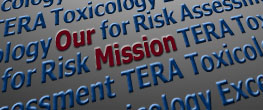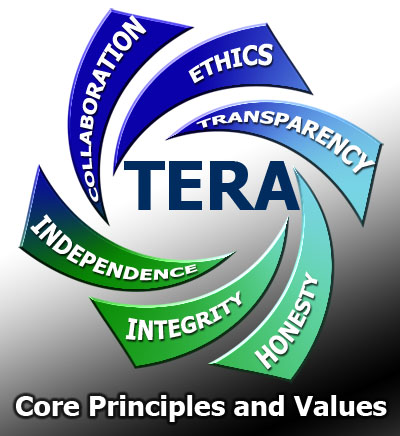Our Mission & History
TERA was founded on the belief that an independent non-profit organization can provide a unique function to protect human health by conducting scientific research and development on risk issues in a transparent and collaborative fashion and communicating the results widely.
 |
TERA Mission
Toxicology Excellence for Risk Assessment (TERA) a non-profit and tax-exempt organization organized for scientific research, and educational purposes has provided sponsors with independent, transparent science since 1995. TERA solves human health risk challenges for diverse government and private sponsors through research and collaboration that emphasizes partnership building across scientific expertise and multiple perspectives to ensure the use of the best science. These strengths are the basis for TERA’s research and development of independent and science-driven analyses for risk assessment. A world leader in independent scientific peer review, TERA provides in-person panel meetings, letter reviews, webcasts and webinars, in-house technical reviews, and workshops. Our mission is to support the protection of public health by developing environmental and public health research, review, and communication toxicology and risk assessment values and analyses; improving risk methods through applied research; and, educating risk assessors, and the public on environmental and public health issues, toxicology and risk assessment issues.
Independence from all parties and groups is essential in order for our scientific and results to be seen as credible by all parties. TERA has instituted policies and procedures, and maintains a corporate environment that ensures that all of our research and work efforts are conducted in a manner that maintains our independence. We conduct all our research and development work in a scientifically objective fashion with our results reflecting our best critical analysis and objective evaluation of the scientific information. We are continuously vigilant to make sure that we remain open to new ideas, but we are not swayed or influenced by our funding sponsors, or any other party, in reaching our conclusions or communicating our results.
 |
TERA Core Principles and Values
![]() Honesty and Integrity - we operate at the highest level of ethical and scientific standards, fully communicating issues and uncertainties
Honesty and Integrity - we operate at the highest level of ethical and scientific standards, fully communicating issues and uncertainties
![]() Independence - we approach our work with an open mind and objectivity, without regard to sponsor or stakeholder interests
Independence - we approach our work with an open mind and objectivity, without regard to sponsor or stakeholder interests
![]() Transparency - we share our work broadly to maximize benefit to public health
Transparency - we share our work broadly to maximize benefit to public health
![]() Collaboration - we use collaboration as a fundamental and preferred approach to technical problem resolution
Collaboration - we use collaboration as a fundamental and preferred approach to technical problem resolution
These core principles guide day-to-day TERA operations - from our consideration of new projects and sponsors, to our scientific evaluations and communication of results. A number of measures insure our work is based upon our principles. For example:
![]() All of our scientific staff recognize the importance of independence and scientific objectivity and continually monitor their projects and personal work efforts to insure we maintain our high ethical and scientific standards. These standards are clearly communicated to all staff as part of both formal and informal training.
All of our scientific staff recognize the importance of independence and scientific objectivity and continually monitor their projects and personal work efforts to insure we maintain our high ethical and scientific standards. These standards are clearly communicated to all staff as part of both formal and informal training.
![]() We are transparent about how we do our work and the methods and approaches we use, so that others can evaluate and judge the strength and scientific validity of our conclusions.
We are transparent about how we do our work and the methods and approaches we use, so that others can evaluate and judge the strength and scientific validity of our conclusions.
![]() We strive to fully characterize and communicate scientific uncertainties and limitations in our work.
We strive to fully characterize and communicate scientific uncertainties and limitations in our work.
![]() We are transparent about who our funders are and what role they had, if any, in commenting on the TERA scientific opinions or results. We make it clear to all funders and sponsors of our work that TERA is an independent scientific organization and as such we will provide them our independent scientific evaluation and conclusions. We discuss (prior to starting work) the level and types of involvement of the sponsors and other outside parties.
We are transparent about who our funders are and what role they had, if any, in commenting on the TERA scientific opinions or results. We make it clear to all funders and sponsors of our work that TERA is an independent scientific organization and as such we will provide them our independent scientific evaluation and conclusions. We discuss (prior to starting work) the level and types of involvement of the sponsors and other outside parties.
![]() We offer our independent scientific services to a broad range of sponsors, including government agencies, industry, non-governmental organizations, and consultants. By collaborating with many types of organizations, TERA gains an appreciation and understanding of the scientific perspectives of these various parties. We utilize this understanding and the resulting relationships to identify and encourage collaboration among a range of parties to improve risk assessment and protection of public health.
We offer our independent scientific services to a broad range of sponsors, including government agencies, industry, non-governmental organizations, and consultants. By collaborating with many types of organizations, TERA gains an appreciation and understanding of the scientific perspectives of these various parties. We utilize this understanding and the resulting relationships to identify and encourage collaboration among a range of parties to improve risk assessment and protection of public health.
![]() We seek to have a balance of work among public and private sector. In recent years about 2/3 of our work has been for government agencies and the other 1/3 for industry and others. (see https://tera.org/about/FundingSources.html for a breakdown by year).
We seek to have a balance of work among public and private sector. In recent years about 2/3 of our work has been for government agencies and the other 1/3 for industry and others. (see https://tera.org/about/FundingSources.html for a breakdown by year).
![]() TERA evaluates each new project to insure that it is mission related, will benefit public health, and that TERA’s participation will make a quality contribution to the effort. We decline projects that do not meet these criteria.
TERA evaluates each new project to insure that it is mission related, will benefit public health, and that TERA’s participation will make a quality contribution to the effort. We decline projects that do not meet these criteria.
![]() We strive to publish our work in the peer-reviewed literature or on our website to make the work available to a broad audience.
We strive to publish our work in the peer-reviewed literature or on our website to make the work available to a broad audience.
![]() In addition to our paid work, TERA provides significant pro bono support to local and state governments, NGOs and others to help them address important human health and risk issues.
In addition to our paid work, TERA provides significant pro bono support to local and state governments, NGOs and others to help them address important human health and risk issues.
 |
History
Toxicology Excellence for Risk Assessment (TERA) is a non-profit corporation dedicated to the best use of toxicity data for risk assessment. TERA was founded in 1995 by Dr. Michael Dourson, a board-certified toxicologist with 15 years experience working for the U.S. Environmental Protection Agency (EPA). TERA helps environmental, industry, and government groups find common ground through the application of good science to risk assessment. In fostering successful partnerships, improvements in the science and practice of risk assessment will follow.
With many years of risk assessment experience at U.S. EPA and in industry, our staff is highly qualified to provide aid with the following risk assessment tasks:
![]() developing new risk values,
developing new risk values,
![]() conducting original risk assessment research,
conducting original risk assessment research,
![]() reviewing assessments prepared by other parties,
reviewing assessments prepared by other parties,
![]() analyzing risk positions and approaches of government agencies and industry,
analyzing risk positions and approaches of government agencies and industry,
![]() providing expert opinion for litigation support,
providing expert opinion for litigation support,
![]() designing toxicological and exposure studies,
designing toxicological and exposure studies,
![]() and preparing educational or training materials.
and preparing educational or training materials.
Toxicology Excellence for Risk Assessment is organized under section 1702.01 et seq. of the Ohio Revised Code, Non-Profit Corporation and has been granted tax-exempt status under section 501(c)(3) of the Internal Revenue Code by the Internal Revenue Service. TERA is organized exclusively for scientific purposes, including for such purposes, the making of distributions to other organizations that qualify as exempt under section 501(c)(3) of the Internal Revenue Code, or the corresponding section of any future federal tax code. Contributions to TERA are tax deductible to the full extent allowed by the law. TERA has chosen to organize as a non-profit corporation as a way to facilitate successful partnerships between environmental, industry and government groups.
As an independent non-profit, we strive to support the protection of public health by providing legislators, risk managers, and ordinary citizens with the risk and toxicological information they need to make important decisions about the chemicals in our lives.
TERA was awarded the Independent Charities Seal of Excellence. This award is given to the members of Independent Charities of America and Local Independent Charities of America that have, upon rigorous independent review, been able to certify, document, and demonstrate on an annual basis that they meet the highest standards of public accountability, program effectiveness, and cost effectiveness. These standards include those required by the US Government for inclusion in the Combined Federal Campaign, probably the most exclusive fund drive in the world. Of the 1,000,000 charities operating in the United States today, it is estimated that fewer than 50,000, or 5 percent, meet or exceed these standards, and, of those, fewer than 2,000 have been awarded this Seal.